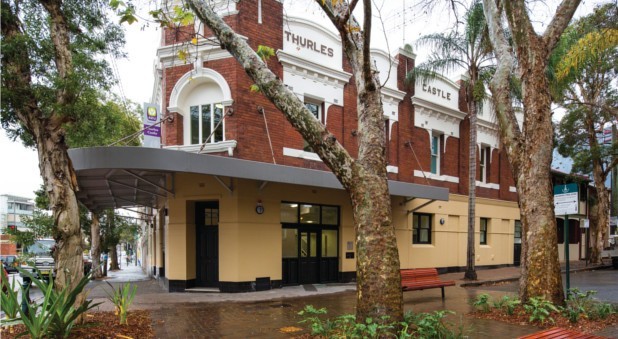Anglican Retirement Villages (ARV) has opened a shared living space and unit complex in the inner city for seniors at risk of homelessness – within the walls of a former pub.
The Thurles Castle Hotel, a former Chippendale pub that also re-emerged at various times as a café and commercial office space, has now been converted into a place of shelter and community for older people who were either homeless or at risk of homelessness.
The facility is currently home to 10 clients, with the remaining five places expected to be filled by early this month. It has been open since mid-October.
“It goes back to ARV deciding a couple of years ago to broaden access – that is, make the services that ARV can provide available to a wider group of people,” says ARV’s general manager for governance and communications, Ross Pendlebury. “One element of that is to provide accommodation to older people at risk of homelessness.”
Mr Pendlebury says one of the distinctive differences of Thurles Castle, compared to many other similar housing centres for at-risk patrons, is that it provides long-term accommodation and community, not simply a short-term fix.
“We regard this as a long-term solution and that’s why we want more,” he says, “because while 15 is a good start, the people we accommodate are part of an unseen group of homelessness.
“With the homeless population, you can get numbers of the people who are in that group, but the people who are at risk are falling through the cracks. The research that we’ve done suggests that the number of people at risk of homelessness is much bigger than you would think, and is only going to grow.”
Mr Pendlebury says ARV is planning to establish a network of similar centres across Sydney in order to provide more accommodation to people who are in similar situations. While these plans are currently in the very early stages, he says a development application has been lodged with Penrith City Council for a proposed site in that local government area.
According to the manager at Thurles Castle, Sheryl Plunkett, the centre provides separate units for each client as well as a communal kitchen, living area and garden. She says that while people have their own rooms as they would if they lived in a standard block of units, the shared living spaces make it easier for them to strike up genuine friendships.
“People can still go and heat up food in their own rooms with their own microwaves and things like that, but common areas draw people together,” Ms Plunkett says.
“What we have seen is that friendships are developing, and common interests are coming to light. People are getting involved in gardening together, the men are getting in there and keen to get that going, as well as a vegetable patch. And it’s these kinds of things that I think help bring people together.”
Mr Pendlebury says there is high demand for this kind of service. And while the number of people at risk of homelessness – particularly in their old age – is large, he hopes the Thurles Castle centre and others like it might just make a dent, and a difference.
“We continue to be on the search for other opportunities,” he says.
“It is a huge task, and I guess in terms of how you approach it, in some ways it’s the same question as, ‘How do you eat an elephant?’ One bite at a time.”





























